- Register
- Log in to Tune-In
- Wishlist (0)
-
Shopping cart
(0)
You have no items in your shopping cart.
Beatles News

John Lennon was so popular he got to meet heads of state. At one point, he even met the Prime Minister of Canada, Pierre Trudeau, the father of Justin Trudeau. Here’s what John thought about this experience.
In the 1971 book Lennon Remembers, Jann S. Wenner interviewed John about the times he crossed paths with a number of world leaders, including Israeli Prime Minister Golda Mier and British Prime Minister Harold Wilson. He had the most to say about his interaction with the elder Trudeau. According to the CBC, John and Yoko Ono met with Trudeau to promote peace in 1969. John and Yoko requested the meeting.
According to The New Yorker, John and Yoko were quite taken with Trudeau. Yoko commented he was “more beautiful than we expected.” In addition, John said “If all politicians were like Mr. Trudeau, there would be world peace.” That’s a major compliment from an artist who made peace a major theme in his music and his activism.
Source: cheatsheet.com
details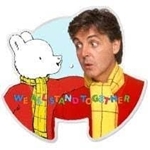
Paul McCartney will reissue his 1984 children’s song “We All Stand Together,” a.k.a. “The Frog Song,” as a limited-edition seven-inch vinyl picture disc on November 6 in honor of the 100th anniversary of the popular British comic strip Rupert Bear.
The song was the centerpiece of the 1984 short film Rupert and the Frog Song that was written and produced by McCartney and featured the former Beatles legend as the voice of Rupert Bear. The movie was animated and directed by Geoff Dunbar. The track was produced by George Martin, and featured McCartney accompanied by The King’s Singers and the choir of St. Paul’s Cathedral.
Like the original 1984 version of “We Stand Together,” the new picture disc is specially shaped and includes the instrumental B-side “We All Stand Together (Humming Version).” The reissue, which you can pre-order now, also comes packaged with a poster. The track has been remastered at London’s Abbey Road Studios.
Source: Music News Group/seacoastoldies.com

John Lennon was said to be “physically sick” from nerves before performing with Elton John at a 1974 show in New York’s Madison Square Garden after the Beatle lost a bet with Elton.
Elton worked extensively with Lennon on his 1974 ‘Walls and Bridges’ album, providing backing vocals and piano on the lead single ‘Whatever Gets You Through The Night’.
Despite not being a firm favourite of Lennon’s, Elton convinced him to release the track – and wagered that they would have to perform the number together if it topped the Billboard Hot 100.
When the song went on to bag the top spot and became a massive hit, Elton revealed that Lennon was then faced with battling his nerves before the pair performed it in November 1974.
Source: Nick Reilly/nme.com
details
The Beatles - both throughout their careers, and long after they ended - have had countless books written about them, but thankfully, none like this. The Beatles 101 tells the story of the fab four using a unique method of cutting down their stories into 101 defined chapters. The stunning hardback delves into such cultural enigmas as "Paul McCartney is dead", and some intriguing factoids on how and where some iconic songs were written and recorded.
Fans of The Beatles will always be looking for more information about John Lennon, Paul McCartney, Ringo Starr, and George Harrison - and The Beatles 101 brings all of the most interesting facts to the front an centre.
Few people today question why the band are still so implicitly successful, something The Beatles 101 author Vikki Reilly was more than happy to discuss.
Source: Callum Crumlish/express.co.uk
details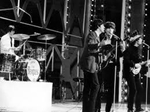
The Beatles on stage at the ABC in Blackpool
It’s blast from the past time again, linking some famous showbiz names; the Beatles, Freddie Starr, Mike Berry and Lennie Bennett.
It’s sparked off by a couple of Gazette items in the past week.
News that the Mersey Beatles are coming to the Opera House in November reminded me that I could be coining it right now - if only I’d got the autographs of the original Beatles at the old ABC Theatre in 1965.
I was chatting with Paul McCartney and Ringo Starr in the stalls during the afternoon sound checks for ITV’s live Sunday night Blackpool Show.
Just think - four signatures on my Press invitation would be worth a cruise for two now. Maybe not a cruise - but something exotic next year!
The Beatles twice did Sunday night telecasts from the ABC, on July 19, 1964, and on August 1, 1965.
Source: blackpoolgazette.co.uk
details
For all those people who want to live in a ‘Yellow Submarine’ on Penny Lane, this Beatles newsletter is for all you Fab Four fanatics out there.
Look, we all know that The Beatles are arguably the greatest band to have ever walked this green(ish) earth.
And it’s a testament to their greatness that the band and its four members – John Lennon, Paul McCartney, George Harrison, and Ringo Starr – are still relevant today in an age of
Since the Beatles can’t seem to stop doing stuff and everyone can’t seem to quit them (us definitely included), we’ve started a newsletter dedicated to anything and everything about the Fab Four.
To guarantee you keep in the loop about all things Beatles ‘Eight Days A Week’, just fill out the form below and we’ll do the rest.
This newsletter doesn’t just cover news stories related to the Beatles, like Mark Chapman’s apology to Yoko Ono or whenever some big-name artist decides to cover their favourite song by the quartet.
Source: Alexander Pan/tonedeaf.thebrag.com
details
A Liverpool Beatles author claims John Lennon hid the true meaning of the song Strawberry Fields Forever because he didn’t want it to reveal too much about his troubled childhood.
Francis Kenny has revised his critically-acclaimed 2014 book The Making of John Lennon to include around an extra 6,000 words, much of which focuses on the origins of the world famous song.
In Understanding John Lennon, he reveals research which points to the lyrics being written not about the Woolton orphanage but about a reform school for boys.
Lennon, says Francis, could see Gladstone Hall from his bedroom window in Mendips, and would have walked past it hundreds of times on his way to and from Quarry Bank school.
Source: theguideliverpool.com
details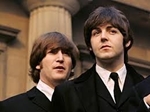
Paul McCartney has spoken in a new interview of his joy at reuniting with The Beatles bandmate and songwriting partner John Lennon.
Talking with Lennon's son Sean, he says that it would have been a ″heartache″ if they hadn't been able to meet up again after the band had been torn apart due to what McCartney calls ″arguing ... business differences.″
Lennon died after being shot outside his apartment on Dec.8, 1980, at the age of 40 — and the landmark of what would have been his 80th birthday is being celebrated in the interview that airs on BBC Radio 2 this weekend.
″I always say to people, one of the great things for me was that after all The Beatles rubbish and all the arguing and the business, you know, business differences really .. that even after all of that, I'm so happy that I got it back together with your dad,″ McCartney, 78, says. ″It really, really would have been a heartache to me if we hadn't have reunited. It was so lovely to me that we did and it really gives me strength to know that."
Source: Simon Perry/yahoo.com

Peter Jackson's The Beatles documentary has been given a new release date for Australian cinemas.
Originally scheduled to hit US cinemas on 4 September, The Beatles: Get Back's Australian release will now move forward a week to 26 August, 2021.
The Beatles: Get Back, to be released by Walt Disney Studios, looks at the making of the iconic band's final album Let It Be and features their last ever concert on London's Savile Row rooftop.
“Working on this project has been a joyous discovery. I’ve been privileged to be a fly on the wall while the greatest band of all time works, plays and creates masterpieces," Jackson said.
"I’m thrilled that Disney have stepped up as our distributor. There’s no one better to have our movie seen by the greatest number of people.”
Source: themusic.com.au
details
Paul McCartney appears as one of the interviewees in a new BBC radio documentary marking what would have been John Lennon‘s 80th birthday.
The documentary, John Lennon at 80, is broadcast from 9-10pm on Saturday 3 and Sunday 4 October on BBC Radio 2 and BBC Sounds, and is presented by Lennon’s son Sean Ono Lennon.
McCartney was asked whether he and Lennon wrote “any throwaway songs that were sort of bad? Or was this kind of like, you just struck gold from the beginning?”
“There were a few songs that weren’t very good,” McCartney said. “There were a few that were clearly [by] young songwriters who don’t quite know how to do it. There was one called ‘Just Fun’.”
Elsewhere, McCartney revealed that even after The Beatles’ split, he continued to be influenced by Lennon.
Source: topi.radio
details
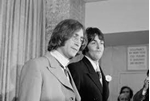
Sir Paul McCartney has admitted how grateful his is that he had the chance to reconnect with Beatles bandmate John Lennon before his death.
The relationship became strained between the pair after Lennon quit the band, leading to its dissolution after the release of their final album Let It Be in 1970.
Lennon was murdered by obsessed fan Mark Chapman outside his New York apartment on 8 December 1980, aged 40.
McCartney, 78, has now revealed in conversation with Lennon’s son Sean Ono Lennon, 44, for new BBC Radio 2 documentary John Lennon At 80: “I always say to people, one of the great things for me was that after all The Beatles rubbish and all the arguing and the business, you know, business differences really… that even after all of that, I'm so happy that I got it back together with your dad.
Source: yahoo.com
details
Abbey Road (1969) has always enjoyed a shining reputation. Right after its release, the final studio album by The Beatles received one breathless review after another and spent 11 weeks at No. 1 on the Billboard charts. It’s hard to have more critical and commercial success.
But as the decades passed, you saw Beatles fans and cultural critics treating Sgt. Pepper’s Lonely Hearts Club Band (1967) with even greater reverence. In 2003, when Rolling Stone compiled its “500 Greatest Albums” list, Sgt. Pepper claimed the top spot.
That hardly came as a surprise. After all, the record has long represented the turning point in pop music, even though many (including John Lennon) preferred other Beatles albums. However, the tide may have finally turned in Abbey Road’s favor.
While every other Beatles record exited the top 10 in the 2020 Rolling Stone “Greatest Albums” poll, Abbey Road moved up among the elite of music history. In the last few years, the record’s reputation has actually grown.
Source: cheatsheet.com

A totally unauthorised and 100 % unofficial tribute to John Lennon celebrating (believe it or not) his 80th birthday is to take place at London’s Stash Gallery. Curator Harry Pye has selected 80 artists (some very well known) and asked them to make a work to mark the life and career of this great artist and cultural legend.
I still turn to John Lennon when I need cheering up or feel in need of inspiration – Harry Pye Curator
“COVID 19 won’t stop our show. We’ve accepted we can’t have one big opening party but we can have 4 small-ish ones on each of the first 4 Fridays in October. The venue we’ve picked is located near Aldgate East tube and is part of the club Vout-O-Reene’s. John Lennon’s Not Dead will feature; drawings, paintings, photography, and collage. There will also be some specially made music and animation and some surprise performances.
Source: artlyst.com
details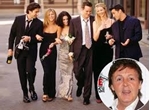
It has been revealed that Paul McCartney was close to being cast in hit US sitcom Friends.
The former Beatle, who played two shows at London’s O2 Arena over the weekend, was headhunted for the role of Ross Geller’s father-in-law back in 1998. Speaking to Huffington Post recently, the show’s casting director Leslie Litt confirmed that the creators wanted McCartney for Season Four’s two-part finale, which saw Geller marrying British love interest Emily Waltham (played by Helen Baxendale) in London. Emily’s father was eventually portrayed by Scottish-born actor Tom Conti.
“I went through his manager and gave him all the details,” Litt said. “One day, someone in the office brought me a faxed letter written to me by Paul himself!” Litt continued to tell Huffington Post: “He thanked me for my interest and said how flattered he was, but it was a very busy time for him.”
Source: Luke Morgan Britton/nme.com
details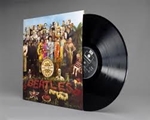
The Beatles’ Sgt. Pepper’s Lonely Hearts Club Band is often seen as a peak for the Fab Four, if not for rock music in general. John Lennon certainly had some warm feelings toward the album. However, he also felt it was inferior to one of his solo albums.
The album John Lennon called ‘Sergeant Lennon’
In Jann S. Wenner’s book Lennon Remembers, Wenner remarked how John had warm feelings about Sgt Pepper’s. For decades, Sgt. Pepper’s was widely considered The Beatles’ best work and John described the album as a “peak.” John noted how, when crafting that album, he and Paul McCartney were truly collaborating. Though he liked the songs he wrote for the White Album better, John felt Sgt. Pepper’s was ultimately superior. Then, Yoko Ono chimed in to give her opinion on Sgt. Pepper’s.
Source: cheatsheet.com
details